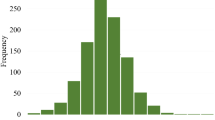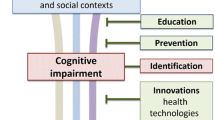Abstract
Background and aims: The aim of the present study is to describe the effects of aging on various cognitive domains (global cognitive function, executive function, motor speed) in a population sample of elderly men, and to describe how their age-related changes are influenced by education, depression, or prevalent cerebrovascular accidents (CEVD). Methods: A cross-sectional observational study was conducted in a cohort of 334 men, 65 to 95 years old, living in rural communities, participating in the Italian cohort of two population studies — MATISS (Malattie cardiovascolari ATerosclerotiche Istituto Superiore di Sanità) and FINE (Finland, Italy, Netherlands, Elderly). Global cognitive function was measured by the Mini-Mental State Examination (MMSE), executive function by the Stroop test, motor speed by the Purdue Pegboard test, and depression by the CES-D test. Prevalence of cerebrovascular accidents (CEVD), myocardial infarction, and diabetes were evaluated by a questionnaire and a clinical examination. Blood pressure, and total and HDL cholesterol were measured. Current smoking status was self-reported. Results: An age-associated decline in global cognitive functions, executive functions, and motor speed was observed. The decline is more apparent after the age of 85 for the MMSE, and after 75 for executive functions and motor speed. Logistic regression analysis revealed that age was independently associated with altered global cognitive functions, executive functions, and motor speed, even after adjusting for education, depression or prevalent CEVD. Conclusions: In a cohort of community-living elderly men aged 65 to 95 years, age-associated changes in mental functions are more evident after the age of 85. These changes are independent of education, depression, or prevalent CEVD.
Similar content being viewed by others
References
Gill C, Richardson E, Tinetti M. Evaluating the risk of dependence in activities of daily living among community living older adults with mild cognitive impairment. J Gerontol 1995; 50: 235–41.
Weiler PG, Lubben JE, Chi I. Cognitive impairment and hospital use. Am J Public Health 1991; 81: 1153–7.
Liu IY, Lacroix AZ, White L. Cognitive impairment and mortality: a study of possible confounders. Am J Epidemiol 1990; 132: 136–43.
Wechsler D. The measurement and appraisal of adult intelligence. Baltimore: Williams & Wilkins, 1958.
Thurstone LL. Primary mental abilities. Chicago. University of Chicago Press, 1938.
Cattell RB. Abilities: Their structure, growth and action. Boston: Houghton Mifflin, 1971.
Schaie KW. The Seattle Longitudinal Study: a thirty-five year inquiry of adult intellectual development. Am Psychol 1994; 49: 304–13.
Schaie KW, Hertzog C. Fourteen-year cohort-sequential analyses of adult intellectual development. Dev Psychol 1983; 19: 531–43.
Keys A. Coronary heart disease in the Seven Countries. Circulation 1970; XLI–XLII: i14–i19.
Menotti A, Mulder I, Nissinen A, et al. Cardiovascular risk factors and 10-year all-cause mortality in elderly European male populations; the FINE study. Finland, Italy, Netherlands, Elderly. Eur Heart J 2001; 22: 573–9.
Seccareccia F, Pannozzo F, Dima F, et al. Malattie Cardiovascolari Aterosclerotiche, Istituto Superiore di Sanità Project. Heart rate as a predictor of mortality: the MATISS project. Am J Public Health 2001; 91: 1258–63.
Launer LJ, Oudkerk M, Nilsson LG, et al. CASCADE: a European collaborative study on vascular determinants of brain lesions. Neuroepidemiology 2000; 19: 113–20.
Rose GA, Blackburn H, Gillum RF, Prineas RJ. Cardiovascular Survey Method. WHO, Geneva, 1982.
Radloff LS. The CESD scale: a self-report depression scale for research in the general population. Appl Psychol Meas 1977; 1: 385–401.
Husaini BA, Neff JA, Harrington JB, et al. Depression in rural communities validating the CES-D scale. J Commun Psychol 1980; 8: 20–7.
Folstein MF, Folstein SE, McHugh PR. Mini-mental state. A practical method for grading the state of patients for the clinician. J Psychiatr Res 1975; 12: 189–98.
Stroop JR. Studies of interference in serial verbal reactions. J Exp Psychol 1935; 18: 643–62.
Desrosiers J, Hebert R, Bravo G, Dutil E. The Purdue Pegboard Test: normative data for people aged 60 and older. Disabil Rehabil 1995; 17: 217–24.
Petersen RC, Stevens JC, Ganguli M, et al. Practice parameter: early detection of dementia: mild cognitive impairment (an evidence-based review). Report of the Quality Standards Subcommittee of the American Academy of Neurology. Neurology 2001; 56: 1133–42.
O’Brien JT, Erkinjuntti T, Reisberg B, et al. Vascular cognitive impairment. Lancet Neurol 2003; 2: 89–98.
Prencipe M, Santini M, Casini AR, Pezzella FR, Scaldaferri N, Culasso F. Prevalence of non-dementing cognitive disturbances and their association with vascular risk factors in an elderly population. J Neurol 2003; 250: 907–12.
Di Carlo A, Baldereschi M, Amaducci L, et al. Cognitive impairment without dementia in older people: prevalence, vascular risk factors, impact on disability. The Italian Longitudinal Study on Aging. J Am Geriatr Soc 2000; 48: 775–82.
Steffens DC, Helms MJ, Krishan RR, Burke GL. Cerebrovascular disease and depression symptoms in the Cardiovascular Health Study. Stroke 1999; 30: 2159–66.
Berger AK, Fratiglioni L, Forsell Y, Winblad B, Backman L. The occurrence of depressive symptoms in the preclinical phase of AD. A population-based study. Neurology 1999; 53: 1998–2002.
Reding M, Haycox J, Blass J. Depression in patients referred to a dementia clinic. Arch Neurol 1985; 42: 894–6.
Kral VA, Emery OB. Long-term follow-up of depressive pseudodementia of the aged. Can J Pychiatry 1989; 34: 445–6.
Sultzer DL. Neuroimaging and the origin of psychiatric symptoms in dementia. Int J Psychogeriatr 1996; 8: 239–43.
Lopez OL, Jagust WJ, Dulberg C, et al. Risk factors for mild cognitive impairment in the Cardiovascular Health Study Cognition Study: part 2. Arch Neurol 2003; 60: 1394–9.
Paterniti S, Verdier-Taillefer MH, Dufouil C, Alperovitch A. Depressive symptoms and cognitive decline in elderly people. Longitudinal study. Br J Psychiatry 2002; 181: 406–10.
Adleman NE, Menon V, Blasey CM, et al. A developmental fMRI study of the Stroop Color-Word task. Neuroimage 2002; 16: 61–75.
Crafton KR, Mark AN, Cramer SC. Improved understanding of cortical injury by incorporating measures of functional anatomy. Brain 2003; 126: 1650–9.
Garry MI, Kamen G, Nordstrom MA. Hemispheric differences in the relationship between corticomotor excitability changes following a fine-motor task and motor learning. J Neurophysiol 2003 Nov 19 [Epub ahead of print].
Author information
Authors and Affiliations
Corresponding author
Rights and permissions
About this article
Cite this article
Scuteri, A., Palmieri, L., Noce, C.L. et al. Age-related changes in cognitive domains. A population-based study. Aging Clin Exp Res 17, 367–373 (2005). https://doi.org/10.1007/BF03324624
Received:
Accepted:
Published:
Issue Date:
DOI: https://doi.org/10.1007/BF03324624




